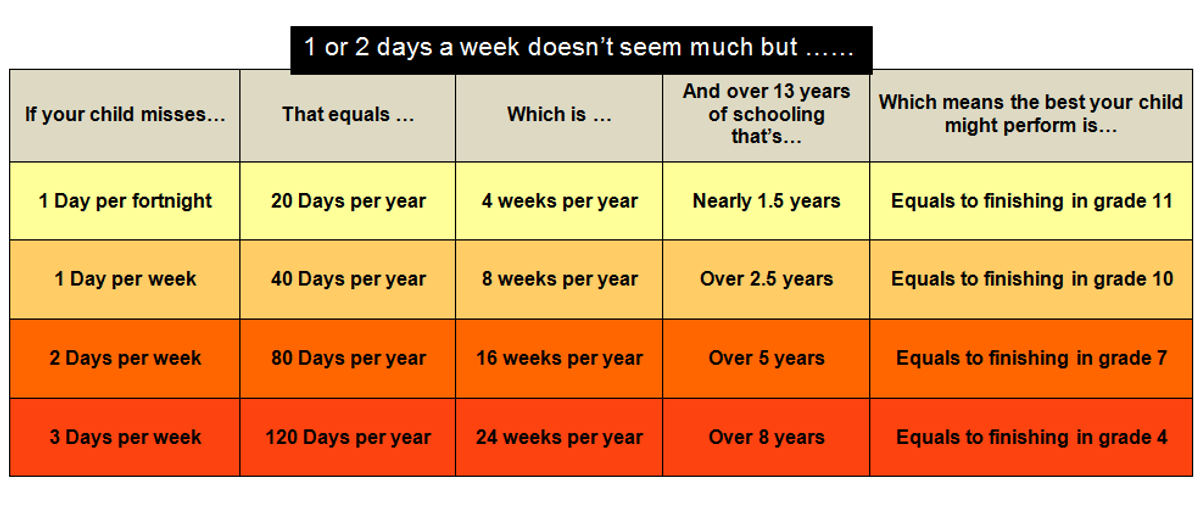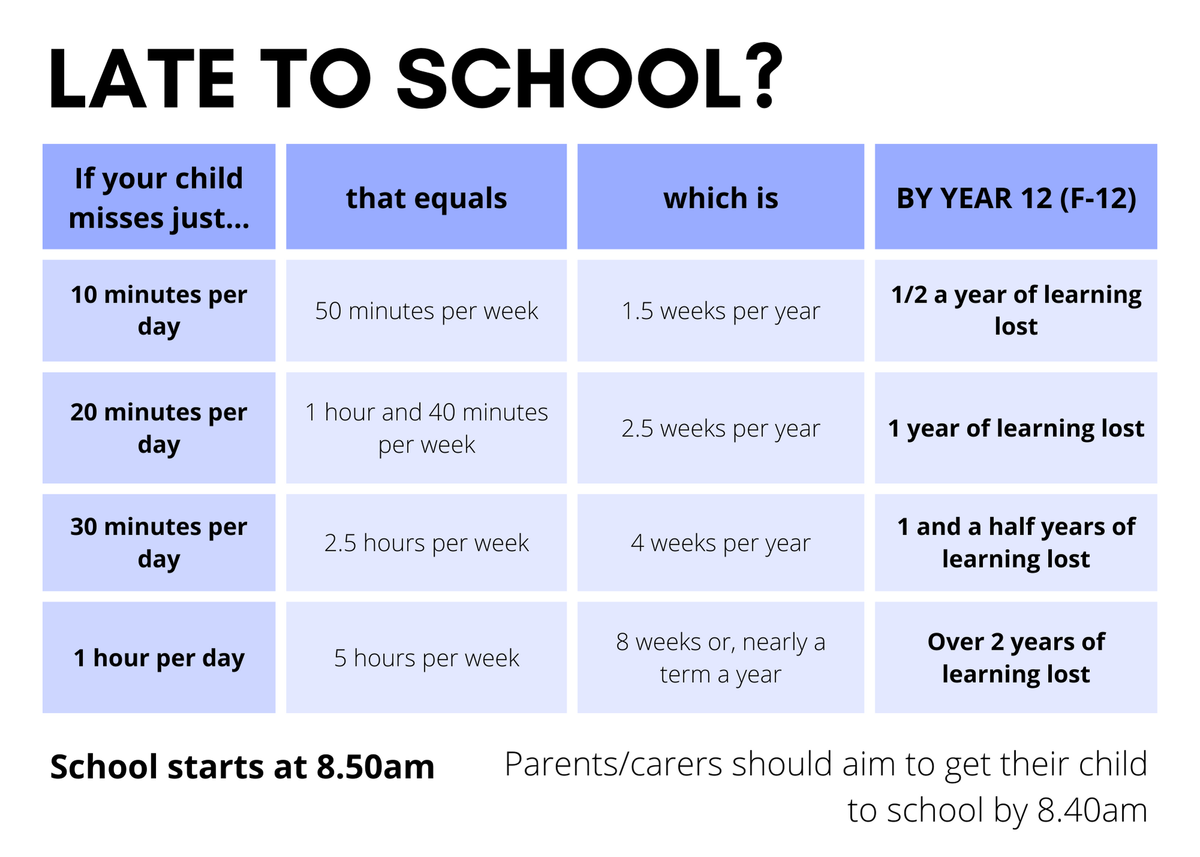Attention please!
Focus on attendance.

Attention please!
Focus on attendance.


Going to school every day is the single most important part of your child’s education. Students learn new things at school every day. Attending and participating in school will help your child develop:
Children who attend school every day and complete year 12 have:
There is no safe number of days for missing school. Each day a student misses puts them behind.
Please ensure that all student absences are reported to the school. This can be done by:
Thank you for your assistance with this.
Why it’s important:
The main reasons for absence are as follows. Please be aware that the guidelines regarding attendance differ for VCE students and those in Years 7-10.
Sickness - There are always times when students need to miss school, such as when they’re ill. It’s vital that they’re only away on the days they are genuinely sick and that you are obtaining a medical certificate for a VCE student.
Family holidays - It's vital that holidays are planned during school holidays where possible, and not during the term. If you are planning to go on holiday during term time, make sure that you talk to your child’s school in advance, and work with them to develop an absence learning plan. Family holidays are not considered APPROVED absences for VCE students.
A death in the family - Contact your child's Year level Leader and let them know how long your child will be away. The school can offer counselling and keep an eye on your child’s wellbeing when they return.
Koorie/Indigenous student cultural absences (including Sorry Business) - For families of Koorie students, we encourage you to let us know when there is Sorry Business. We can work with you, your child and the Koorie Engagement Support Officer to identify the right support. The school will record the absence in a specific category for Sorry Business. The category accounts for the unique responsibilities that come with this type of absence.
“Day off” – Think twice before letting your child have a “day off” as they could fall behind their classmates – every day counts. A day off without a medical certificate is not considered an APPROVED absences for VCE students.
Truancy – This is when students choose not to go to school without their parent’s permission. There can be many reasons for truancy. The best way to address this is for schools and parents to work together.
School refusal - School refusing children will experience significant emotional distress not only when going to school but also at the thought of going to school; they may be absent from school for weeks or even months at a time. School refusal differs from truancy as children generally stay home with the knowledge of the parents and despite their best efforts to encourage their child to go to school.
The Department of Education and Training requires that children of school age (six to seventeen years) are in full-time attendance at a government or registered non-government school unless formally exempt. Our College requires that post-compulsory aged students also attend school unless a valid reason exists.
At Sandringham College all students in Years 7 to 12 are required to have an attendance rate of at least 90%. Students engaged in VET programs* as part of their study are also required to meet the attendance requirements of the program they are enrolled in.
Ongoing unexplained absences, or lack of cooperation regarding student attendance, will result in a formal attendance conference being organised. Unresolved attendance issues of post-compulsory students may effect the student’s ability to satisfactorily complete course requirements and may result in the student being exited from the College. Unresolved attendance issues for students will result in a review of progression and may be reported by the Principal to the Department of Human Services.
VCE & VCE-VM (Year 10, 11 and 12) Attendance
Success in VCE starts with attending each day. This Policy aligns with the VCAA mandate that students must complete 50 hours of class time for each unit that they undertake. In order to meet the College and VCAA attendance requirements, students should attend all scheduled classes.
Whilst Sandringham College is focused on supporting every student to complete their VCE, we are required to implement and enforce attendance expectations as set down by VCAA and the Department of Education and Training. Below is a table that clearly outlines attendance requirements and support structures to assist students who are failing to meet their obligations.
Attendance Levels
Less than 10 periods missed in a VCE Unit 90-100% attendance | VCAA requirements met |
10 periods missed in a VCE Unit 85% -90% attendance | VCAA requirements at risk of breach and VCE ‘at risk’ triggered on COMPASS |
15 periods missed in a VCE Unit 80%-85% attendance | VCAA requirements at significant risk of breach and parent meeting and attendance plan required. |
| 20 periods missed in a VCE Unit | VCAA requirements at serious risk of breach and parent meeting and attendance plan reviewed, changed, and implemented. |
| 25 periods missed in a VCE Unit | ‘Unsatisfactory’ (N) given for Unit. |
* Note that for VET attendance, students who miss more that 2 classes in a Semester/Unit may receive an unsatisfactory (N) result.
What constitutes an approved absence?
What is not considered an approved absence?
Procedures for addressing declining attendance
The College takes a decline in student attendance very seriously as it can impact the capacity of students to achieve the VCE, VCE-VM. The College has a procedure for identifying and responding to declining rates of attendance.
Level 1 Response
If a student’s attendance drops below 10 periods in a Unit 1, 2, 3 or 4 subject the College Attendance Officer is obliged to notify the relevant Year Level Leader via the ‘Student At Risk’ Chronicle notification. The Year Level Leader will contact the student’s parents/carers, issue a Compass Chronicle detailing attendance requirements, offer support and caution regarding the potential for an unsatisfactory result (N)
Level 2 Response
When the attendance of a student falls below 15 periods in a Unit 1, 2, 3 or 4 subject the Year Level or Head of Sub-school will initiate a parent/carer and student meeting and implement an Attendance Plan. The plan will be pinned to the student’s Compass Profile and will be monitored closely by the sub-school..
Level 3 Response
If attendance continues to decline and reaches the threshold 25 periods in a Unit, this will signal the failure to meet VCAA and College requirements and an Unsatisfactory (N) will be assigned for the Unit.
Medical Certificates
If a student is absent from school, they must submit a valid medical certificate from a doctor to the VCE Centre or it must be uploaded to COMPASS by a parent/carer. Online digital medical certificates and certificates from pharmacists are not acceptable under College and VCAA rules.
If a student is absent from school on the day of a SAC you must produce a valid medical certificate from a registered doctor for the absence to be approved. The provision of a medical certificate does not exempt a student from completing a SAC.
The Medical Certificate must be dated for the day of the absence and cannot be back dated.
If more than two SACs are missed due to illness, a parent meeting may be required to discuss ongoing concerns regarding absence from scheduled assessments.
Students who are absent form school due to illness, even with a medical certificate, may encounter challenges in maintaining a level of attendance conducive to success in a particular subject. Long-term certified medical illnesses will be addressed on an individual basis. It is important to note that the recommended attendance levels established by VCAA will continue to be upheld.


https://www.merriam-webster.com/thesaurus/lateness
At Sandringham College, our day of learning starts promptly at 8.50am each day. Students should be at school no later than 8.40am and by 8.50am, students should be lined up outside their classroom ready for learning.
Arriving even a few minutes late can result in an unsettled start to the day for that student and disrupt the rest of the class. As the tables show, a few minutes each day can also add up to be quite a significant period of missed learning over a week, a term, a year and their school life!

